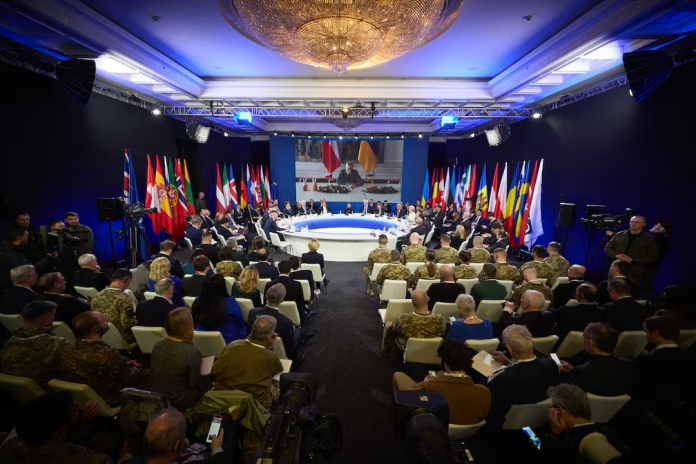The United Nations Security Council (UNSC) has adopted a US-drafted resolution on the Ukraine conflict, taking a more neutral stance amid former President Donald Trump’s renewed peace efforts. The resolution, which passed with key votes from major global players, reflects a shift in the US foreign policy approach under Trump’s influence. However, the move has sparked debates among European allies, Russia, and Ukraine, raising questions about the future of the conflict and international diplomatic relations.
With the third anniversary of Russia’s invasion of Ukraine, the global community remains divided on how to resolve the crisis. Trump, who has been vocal about negotiating peace, has reportedly pressured US diplomats to take a less confrontational approach at the UNSC, moving away from strong condemnations of Russia and focusing instead on a negotiated settlement.
Key Highlights of the UNSC Resolution
- The resolution avoids directly blaming Russia for the war but emphasizes the need for a peaceful settlement.
- Europe and Ukraine pushed for stronger language, but the US resisted amendments that would have condemned Russia’s aggression.
- Russia vetoed a European-led amendment, which sought a tougher stance on the invasion.
- The resolution focuses on territorial integrity, but lacks direct demands for Russia’s withdrawal.
- Donald Trump’s peace proposal continues to influence the US diplomatic position, emphasizing a negotiated ceasefire rather than military escalation.
- Ukraine’s President Volodymyr Zelensky has expressed disappointment over what he perceives as a weaker stance by the US.
Trump’s Role in Shaping US Foreign Policy on Ukraine
Although not officially in office, Trump’s influence over US foreign policy remains strong. His America First approach and long-standing skepticism of NATO’s role in the conflict have led to a more cautious US stance at the UN.
- Trump has repeatedly stated that he could end the Ukraine war within 24 hours if re-elected, suggesting a diplomatic deal between Russia and Ukraine.
- He has criticized massive US military aid to Ukraine, calling for Europe to take on more financial responsibility.
- Republican leaders aligned with Trump have been pressuring the Biden administration to scale back military commitments.
This shift in US positioning is evident in the UN resolution, which avoids any direct threats of sanctions or military escalation. Instead, it promotes diplomatic engagement and negotiations, a stance that Russia has welcomed but Ukraine and European allies have opposed.
Europe’s Pushback Against the US Approach
European Union (EU) leaders and NATO allies have voiced concerns over the US’s neutral stance. Many European nations, particularly France, Germany, and Poland, have been advocating for a harsher resolution condemning Russia’s actions.
- French President Emmanuel Macron has urged Trump and US policymakers to include Europe in future negotiations related to Ukraine.
- European diplomats attempted to amend the resolution to hold Russia accountable, but the US blocked it.
- The European Parliament has warned that a weaker stance on Russia could embolden Moscow’s aggression.
Despite Europe’s efforts, the US resolution passed with a moderate majority, highlighting growing differences between Washington and its European allies.
Russia’s Response and Strategic Gains
Russia, which has faced extensive sanctions and diplomatic isolation since its 2022 invasion of Ukraine, has welcomed the US’s shift. The Kremlin has praised Trump’s efforts, signaling potential readiness for negotiations.
- Russian Foreign Minister Sergey Lavrov described the UN resolution as a step towards a realistic settlement.
- Moscow has accused the EU of trying to escalate tensions by pushing for a stronger condemnation.
- Russia’s veto on the European amendment highlights its continued influence within the UNSC.
While Russia remains firm on its territorial claims, the UN resolution gives it more room for diplomatic engagement, something Trump has long advocated for.
Ukraine’s Reaction: Betrayal or Diplomatic Setback?
The Ukrainian government has reacted negatively to the US-drafted resolution, arguing that it undermines their fight against Russian aggression.
- President Volodymyr Zelensky called the resolution “disappointing”, stating that Ukraine needs stronger support, not neutrality.
- Ukrainian diplomats have accused the US of prioritizing its own political dynamics over Ukraine’s sovereignty.
- Pro-Ukraine lawmakers in the US Congress have criticized Trump’s approach, warning it could weaken global support for Kyiv.
As Ukraine struggles with ongoing military challenges, this policy shift could alter the course of the war, forcing Kyiv to rely more on European allies.
Implications for Global Diplomacy
The UN Security Council’s resolution marks a turning point in the Ukraine conflict, with several major implications:
✔ Potential Shift in US Foreign Policy: Trump’s growing influence suggests a different approach to Ukraine if he returns to office.
✔ Stronger European Role in Ukraine’s Defense: With the US taking a step back, Europe may need to increase military and economic aid to Ukraine.
✔ Russia’s Strategic Gains: The resolution’s neutral tone benefits Moscow, giving it diplomatic leverage.
✔ Ukraine’s Uncertain Future: With reduced US support, Ukraine must reassess its military and diplomatic strategy.
The UN Security Council’s adoption of a neutral US stance on Ukraine, shaped by Donald Trump’s influence, has reshaped global diplomatic efforts. While it offers a potential path for negotiations, it also weakens Ukraine’s position and causes tensions with European allies.
As the war continues into its third year, the world awaits further developments, especially with Trump’s possible return to power in 2025. Whether this UN resolution leads to peace or further division remains to be seen.
Follow Swadesi for more updates!




